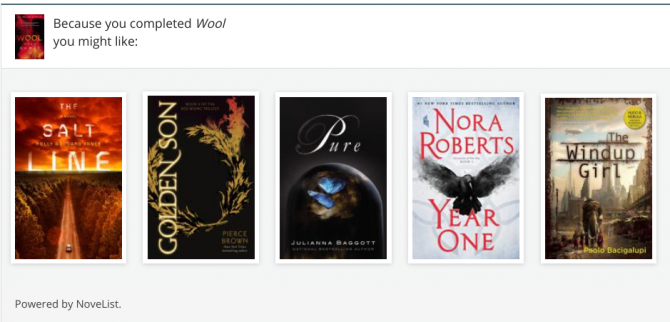There seem to be two kinds of speculative fiction readers these days. (And by these days I mean the ones rife with political unrest the likes of which my generation has never witnessed and oh, also the raging pandemic.) Ones who are still hankering to be transported to a post apocalyptic future and ones who would like to read literally anything else, please and thank you. I thought I would fall under the latter, being a regular consumer of post-apocalyptic and dystopian tales when life is grand as opposed to kind of depressing and scary. But to my surprise, lately I have gobbled up this brand of speculative fiction like it’s going out of style. Which it certainly is not.
My first read of 2021 was brought to me by good ole Bibliocommons. The read-a-like feature powered by NoveList on everyone’s account that takes their latest book ratings and turns them into recommendations is a tool I seldom use. I’m a librarian, after all, but wouldn’t be much of one if I couldn’t even do readers’ advisory for myself, right? But after the algorithm threw out this latest suggestion, I read the blurb and was intrigued enough to pluck it off the shelves, and then proceeded to compulsively read it in a matter of days, I think it’s something I may trust more often going forward. (And perhaps you should give it a shot, too.)
To put it simply, Wool by Hugh Howey absolutely blew my mind. The first book in a trilogy that was first published in 2011, Wool follows the misadventures of a society forced into a giant underground silo by an unknown catastrophe that poisoned the air. The silo community doesn’t know the cause of the apocalypse or exactly how long they’ve been living, breeding, and dying in the silo. All they really know is their work, which depends on their skills and level in the silo, and that they should never speak or even think about going outside.
Wool is broken up into parts, the first of which could stand alone as the most twisty, gripping short story I’ve ever read. (Seriously, read this first bit and just see if you can possibly not continue.) In it we’re introduced to the rich world of the silo by following the sheriff’s unlikely decision to voluntarily “clean”. Lawless and/or incendiary members of the community are sent outside to clean the sensors that give the rest of the silo their only view of the world outside. After they clean them, they suffer certain death in the toxic winds that ravage the earth. One question lingers in the minds of everyone, even though they never give it voice: WHY do the condemned always clean the sensors? Why has no one, ever in anyone’s memory, refused to buff off years of grime just so the society who rejected them and doomed them to die can have a clearer view of the outside?
The answer is only the first of many shocking revelations that dropped my jaw and it happened in the first 30 pages. Unraveling more of the silo’s long kept and carefully protected secrets with Juliette, a plucky, exceedingly capable young woman from the “down deep” of mechanical, was an adventure I wish I could go on anew. Luckily, the thrills continue in Shift, the second book in the Silo Series, which travels back in time to the events that lead to the creation of the silo, eventually overlapping with the events of Wool.
The Silo Series also has a fascinating genesis story, at least to me. Those of us in the book business know of most of the pros, cons, and strong opinions there are out there regarding traditional versus self publishing. Hugh Howey is a self publishing success story for the ages and because of his remarkable trajectory, an outspoken advocate for digital publishing and protecting the earning power of authors. He originally self published the first few chapters of Wool as an Amazon e-book for 99 cents. With absolutely no marketing, purely organic clicks, reads, and then word-of-mouth advertising, Wool became a sensation that was making him 150k a month on e-book sales alone, and then the agents and publishers came to him.
This is a dream scenario for almost every self published author. And it was Simon & Schuster of all publishers, the juggernaut, that actually offered him the deal he insisted on: A print-only deal with no rights to his e-book royalties which was how he had been making a very good living. This type of hybrid deal has become more popular with publishers due to their need to adapt to the digital environment and snatch up the unrepresented bestsellers before the competition does, and is great for authors because it gives them more control over their earning potential.
If you're still strangely drawn to apocalyptic events, shifting alliances, creepy science, revolutions, corrupt leaders and government conspiracies IN YOUR FICTION READING LIFE ONLY (important caveat) then I beseech you to check out Wool. Hugh Howey had a one-of-a-kind story to tell and did so with top notch world building, strong characters, and a plot you simply can't predict. His commercial success, while unconventionally achieved, has been very well earned.
-Leah Newton is a Readers' Services Assistant at Lawrence Public Library.




Add a comment to: If the Lies Don’t Kill You